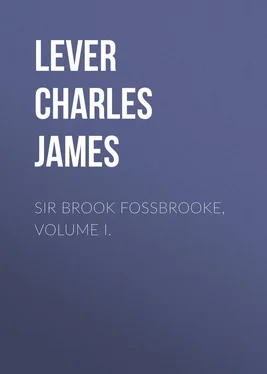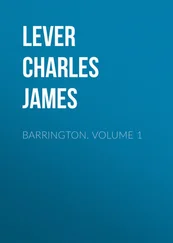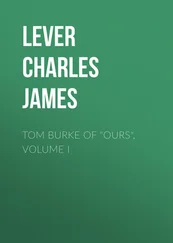Charles Lever - Sir Brook Fossbrooke, Volume I.
Здесь есть возможность читать онлайн «Charles Lever - Sir Brook Fossbrooke, Volume I.» — ознакомительный отрывок электронной книги совершенно бесплатно, а после прочтения отрывка купить полную версию. В некоторых случаях можно слушать аудио, скачать через торрент в формате fb2 и присутствует краткое содержание. Жанр: literature_19, foreign_antique, foreign_prose, на английском языке. Описание произведения, (предисловие) а так же отзывы посетителей доступны на портале библиотеки ЛибКат.
- Название:Sir Brook Fossbrooke, Volume I.
- Автор:
- Жанр:
- Год:неизвестен
- ISBN:нет данных
- Рейтинг книги:3 / 5. Голосов: 1
-
Избранное:Добавить в избранное
- Отзывы:
-
Ваша оценка:
- 60
- 1
- 2
- 3
- 4
- 5
Sir Brook Fossbrooke, Volume I.: краткое содержание, описание и аннотация
Предлагаем к чтению аннотацию, описание, краткое содержание или предисловие (зависит от того, что написал сам автор книги «Sir Brook Fossbrooke, Volume I.»). Если вы не нашли необходимую информацию о книге — напишите в комментариях, мы постараемся отыскать её.
Sir Brook Fossbrooke, Volume I. — читать онлайн ознакомительный отрывок
Ниже представлен текст книги, разбитый по страницам. Система сохранения места последней прочитанной страницы, позволяет с удобством читать онлайн бесплатно книгу «Sir Brook Fossbrooke, Volume I.», без необходимости каждый раз заново искать на чём Вы остановились. Поставьте закладку, и сможете в любой момент перейти на страницу, на которой закончили чтение.
Интервал:
Закладка:
This impression, being rarely personal in its consequences, was not of much moment; but it was conjoined with a more serious error, which was to imagine that all rule and governance in Ireland should be carried on with a Machiavellian subtlety. The people, he had heard, were quick-witted; he must therefore out-manoeuvre them. Jobbery had been, he was told, the ruin of Ireland; he would show its inefficiency by the superior skill with which he could wield its weapon. To be sure his office was a very minor one, its influence very restricted, but Mr. Balfour was ambitious; he was a Viceroy’s nephew; he had sat for months in the House, from which he had been turned out on a petition. He had therefore social advantages to build on, abilities to display, and wrongs to avenge; and as a man too late for the train speculates during the day how far on his road he might have been by this time or by that, so did Mr. Balfour continually keep reminding himself how, but for that confounded petition, he might now have been a Treasury this or a Board of Trade that, – a corporal, in fact, in that great army whose commissioned officers are amongst the highest in Europe.
Let us now present him to our reader, as he lay back in his chair, and by a hand-bell summoned his messenger.
“I say, Watkins, when Clancey calls about those trousers show him in, and send some one over to the packet-office about the phosphorus blacking; you know we are on the last jar of it. If the Solicitor-General should come – ”
“He is here, sir; he has been waiting these twenty minutes. I told him you were with his Excellency.”
“So I was, – so I always am,” said he, throwing a half-smoked cigar into the fire. “Admit him.”
A pale, care-worn, anxious-looking man, whose face was not without traces of annoyance at the length of time he had been kept waiting, now entered and sat down.
“Just where we were yesterday, Pemberton,” said Balfour, as he rose and stood with his back to the fire, the tails of his gorgeous dressing-gown hanging over his arms. “Intractable as he ever was; he won’t die, and he won’t resign.”
“His friends say he is perfectly willing to resign if you agree to his terms.”
“That may be possible; the question is, What are his terms? Have you a precedent of a Chief Baron being raised to the peerage?”
“It’s not, as I understand, the peerage he insists on; he inclines to a moneyed arrangement.”
“We are too poor, Pemberton, – we are too poor. There’s a deep gap in our customs this quarter. It’s reduction we must think of, not outlay.”
“If the changes are to be made,” said the other, with a tone of impatience, “I certainly ought to be told at once, or I shall have no time left for my canvass.”
“An Irish borough, Pemberton, – an Irish borough requires so little,” said Balfour, with a compassionate smile.
“Such is not the opinion over here, sir,” said Pemberton, stiffly; “and I might even suggest some caution in saying it.”
“Caution is the badge of all our tribe,” said Balfour, with a burlesque gravity. “By the way, Pemberton, his Excellency is greatly disappointed at the issue of these Cork trials; why did n’t you hang these fellows?”
“Juries can no more be coerced here than in England; they brought them in not guilty.”
“We know all that, and we ask you why? There certainly was little room for doubt in the evidence.”
“When you have lived longer in Ireland, Mr. Balfour, you will learn that there are other considerations in a trial than the testimony of the witnesses.”
“That’s exactly what I said to his Excellency; and I remarked, ‘If Pemberton comes into the House, he must prepare for a sharp attack about these trials.’”
“And it is exactly to ascertain if I am to enter Parliament that I have come here to-day,” said the other, angrily.
“Bring me the grateful tidings that the Lord Chief Baron has joined his illustrious predecessors in that distinguished court, I ‘ll answer you in five minutes.”
“Beattie declares he is better this morning. He says that he has in all probability years of life before him.”
“There ‘s nothing so hard to kill as a judge, except it be an archbishop. I believe a sedentary life does it; they say if a fellow will sit still and never move he may live to any age.”
Pemberton took an impatient turn up and down the room, and then wheeling about directly in front of Balfour, said, “If his Excellency knew, perhaps, that I do not want the House of Commons – ”
“Not want the House, – not wish to be in Parliament?”
“Certainly not. If I enter the House, it is as a law-officer of the Crown; personally it is no object to me.”
“I’ll not tell him that, Pem. I’ll keep your secret safe, for I tell you frankly it would ruin you to reveal it.”
“It’s no secret, sir; you may proclaim it, – you may publish it in the ‘Gazette,’ But really we are wasting much valuable time here. It is now two o’clock, and I must go down to Court. I have only to say that if no arrangement be come to before this time to-morrow – ” He stopped short. Another word might have committed him, but he pulled up in time.
“Well, what then?” asked Balfour, with a half smile.
“I have heard you pride yourself, Mr. Balfour,” said the other, recovering, “on your skill in nice negotiation; why not try what you could do with the Chief Baron?”
“Are there women in the family?” said Balfour, caressing his moustache.
“No; only his wife.”
“I ‘ve seen her,” said he, contemptuously.
“He quarrelled with his only son, and has not spoken to him, I believe, for nigh thirty years, and the poor fellow is struggling on as a country doctor somewhere in the west.”
“What if we were to propose to do something for him? Men are often not averse to see those assisted whom their own pride refuses to help.”
“I scarcely suspect you ‘ll acquire his gratitude that way.”
“We don’t want his gratitude, we want his place. I declare I think the idea a good one. There’s a thing now at the Cape, an inspectorship of something, – Hottentots or hospitals, I forget which. His Excellency asked to have the gift of it; what if we were to appoint this man?”
“Make the crier of his Court a Commissioner in Chancery, and Baron Lendrick will be more obliged to you,” said Pem-berton, with a sneer. “He is about the least forgiving man I ever knew or heard of.”
“Where is this son of his to be found?”
“I saw him yesterday walking with Dr. Beattie. I have no doubt Beattie knows his address. But let me warn you once more against the inutility of the step you would take. I doubt if the old Judge would as much as thank you.”
Balfour turned round to the glass and smiled sweetly at himself, as though to say that he had heard of some one who knew how to make these negotiations successful, – a fellow of infinite readiness, a clever fellow, but withal one whose good looks and distinguished air left even his talents in the background.
“I think I ‘ll call and see the Chief Baron myself,” said he. “His Excellency sends twice a day to inquire, and I ‘ll take the opportunity to make him a visit, – that is, if he will receive me.”
“It is doubtful. At all events, let me give you one hint for your guidance. Neither let drop Mr. Attorney’s name nor mine in your conversation; avoid the mention of any one whose career might be influenced by the Baron’s retirement; and talk of him less as a human being than as an institution that is destined to endure as long as the British constitution.”
“I wish it was a woman – if it was only a woman I had to deal with, the whole affair might be deemed settled.”
Читать дальшеИнтервал:
Закладка:
Похожие книги на «Sir Brook Fossbrooke, Volume I.»
Представляем Вашему вниманию похожие книги на «Sir Brook Fossbrooke, Volume I.» списком для выбора. Мы отобрали схожую по названию и смыслу литературу в надежде предоставить читателям больше вариантов отыскать новые, интересные, ещё непрочитанные произведения.
Обсуждение, отзывы о книге «Sir Brook Fossbrooke, Volume I.» и просто собственные мнения читателей. Оставьте ваши комментарии, напишите, что Вы думаете о произведении, его смысле или главных героях. Укажите что конкретно понравилось, а что нет, и почему Вы так считаете.












